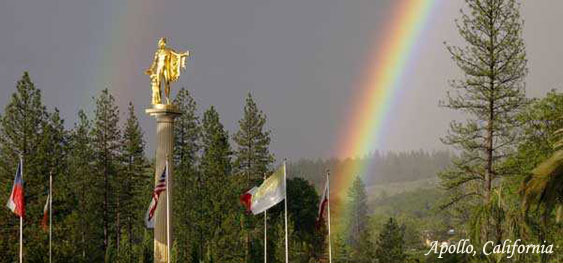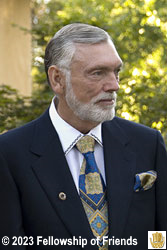

Robert Earl Burton founded the Fellowship of Friends in the San Francisco Bay Area in 1970, with the aim of teaching the Fourth Way principles of Georges Gurdjieff and Peter Ouspensky. Over the years the non-profit organization expanded to embrace a global membership, with Fellowship centers in cities round the world—from Buenos Aires to Mumbai, from Rome to Tokyo. The Fellowship’s community of Apollo, California, is a place where students can have a more intensive opportunity to practice self-remembering and other exercises that lead to a more conscious life. Apollo is home to vineyards and a winery, an art collection and sculpture garden, a meeting hall, and the Theatron, an outdoor theater for enjoying music, dance, and theatrical performances with presence.
Burton has always insisted that he and his students are ordinary people with no special talents, marked only by an unquenchable desire to pursue a path of spiritual awakening. He was born in Little Rock, Arkansas, in 1939, and moved to California with his family four years later. He received his bachelor’s degree in education from San Jose State University in 1963, and became a competitive tennis player as well as a schoolteacher.
In the 1960’s, he gave up his teaching career and, after exploring different spiritual paths, met the Fourth Way teacher, Alexander Francis Horn, and knew that he had found what he sought. He immediately threw himself into the Gurdjieff-Ouspensky work as taught by Alex. Three years later, he created the Fellowship of Friends, taking a more compassionate approach to awakening than his teacher did. Hence, he has termed the Fellowship a “School of Love,” in which he gently but relentlessly reminds his students to remember themselves, to be present, to be.
Woven into Burton’s methods is the concept that “impressions” can be food for the soul. He has tirelessly promoted the arts within the Fellowship, educating himself and encouraging others to educate themselves in all the arts. His artistic appreciation is wide-ranging, and the forms of its expression have varied greatly— from poetry readings to scholarly journals, from impressive art libraries to fountains, landscape gardening, and horticulture. At Apollo, he has founded a museum-level collection focusing, at various periods, on fine porcelain, French and English silver, Old Master paintings, and Chinese furniture from the Ming and early Qing dynasties. Typically, the Fellowship studies, then disperses and redirects its collections, always improved and enlightened by the contact.He reminds his students, “The arts are given to man to remind him to be present.”
He always reminds his students, however, that the arts are a means, rather than an end. “We appreciate the arts and have a limited understanding of them, but what we really understand is how to create a soul,” he said. “There is no higher art form than one’s own individual soul.”
After decades of focusing on the Fourth Way System, it became apparent to Burton that there was a need to go beyond it, to “abandon the system,” in Ouspensky’s words. While acknowledging the brilliance and truth of the Work, Burton also noted that, as Ouspensky said, “The system takes man from birth to death.” If we cannot take our knowledge with us when we die, what can we take? Only our moments of presence. We must internalize our lives, and move away from any focus on external achievements. The busy intellect, our logical mind—and the incessant imagination it produces—is our chief obstacle to presence. The intelligent and civilizing world of an educated heart and mind, which enables us to understand our machines and gain some mastery over them, becomes an impediment at a later point in our development.
He then began seeking for the thread that united all spiritual teachings—the inner truth of Great School, which takes different forms but is ever the same. By isolating that objective truth, he enabled the Fellowship to move from the esoteric to the mystical. He retained the principles of the Fourth Way as a solid foundation, and embraced the mystical core of all traditions,—whether Egyptian, Jewish, Sufi, Christian, Buddhist, Hindu or Zoroastrian. Moving away from the rigorously logical world of Ouspensky and Gurdjieff and into the silent world of symbol, image, myth, and fairy tale, he enabled his students to evade the wordy intellect and create an empty space for the wordless world of the Self.
Throughout his own evolution as a teacher, his chief work of awakening his “beloved students” has never wavered. On more than one occasion he has said that they are “more than I could ask for; I could not ask for so much.”